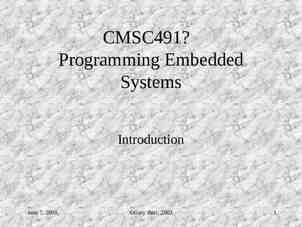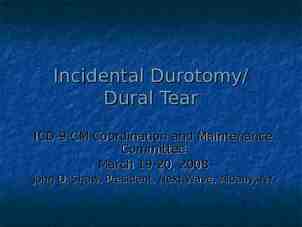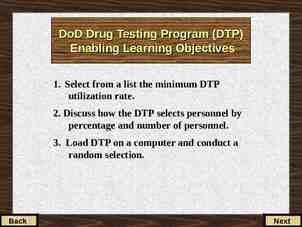Post registration Specialist Community Public Health Nursing standards
24 Slides3.57 MB
Post registration Specialist Community Public Health Nursing standards review School Nursing Webinar July 2020
WELCOME AND AIM TO CONSIDER SCHOOL NURSING IN OUR SCPHN STANDARDS REVIEW 2
Housekeeping Everyone, except the presenters, are automatically muted The “raise your hand” feature will not be used today Use the “?” feature or speech bubble to submit any questions or comments at any time Audio-only participants can email questions and comments to [email protected] We can’t address individual points but everything is being noted for consideration Key emerging themes will be shared in the second part of the webinar The session will be recorded 3
Education programme Standards framework for nursing and midwifery education Standards for student supervision and assessment Future Nurse standards/ Proficiencies Nursing associates standards/ proficiencies Future midwife standards/ proficiencies Standards for Prescribing Return to practice Post-registration under review (SCPHN/SPQ) Quality assurance framework Communications and engagement
Proficiency standards Pre-registration: Nursing, Midwifery, Nursing Associate What nurses/midwives/nursing associates need to know and be able to do to join the register Post registration: Additional qualifications in a particular area of practice, which specify a higher level of knowledge and skill required This includes: A range of “Specialist practice qualifications” (SPQ’s) Specialist Community Public Health Nursing (SCPHN) qualifications (Health Visiting, Occupational Health, and School Nursing) Also: Prescribing (*new standards already published but will be embedded in new post registration standards) 5
SCPHN REVIEW – PROGRESS SO FAR 6
SCPHN project aim To develop new standards of proficiency for Specialist Community Public Health Nursing (SCPHN) in the following fields of SCPHN practice Health visiting School Nursing Occupational Health Nursing To develop associated programme standards 7
Design principles for new standards – to be applied to standards for school nursing 1. 2. Enhanced outcome based requirements Future proof and agile 3. Evidence based regulatory intervention 4. Right touch regulation – proportionate 5. 6. Broad learning environments Measurable and assessable 7. Consistent, clear - NMC style and language 8. Co-produced and consulted 9. Equality and diversity embedded 10. Enables innovation with our partners 11. Surpass existing NMC pre-registration education standards 12. Be appropriate across the four countries of the UK 8
Sources of evidence Covid-19 impact considerations 9
SCPHN core Established a SCPHN core group Early discussions: Emerging themes across all fields of SCPHN practice Draft vision for core SCPHN Consideration will feed into drafting of new standards that are core to SN, HV, and OHN 10
Vision for SCPHN standards Nurses (and midwives) who are: autonomous practitioners in public health capable of adopting a life course approach to their professional practice that is considerate and inclusive driven by evidence and research champions for health and well-being, and health improvement; knows how to and can effect change that reduces health inequalities excellent communicators and educators leaders and collaborators in creating/implementing strategy and policy that ensures interventions positively affect the health of people, families, communities and populations advisors in safety and quality practice delivery 11
Themes from the SCPHN webinar 12
A VISION FOR THE SCHOOL NURSE 13
Some evidence considered for SN standards: one 4 country strategy and policy England: Maximising the school aged children nursing team contribution to the public health of school-aged children 5-19 (Dept of Health and Public Health England 2004) Scotland: The school nursing role in integrated community nursing teams (Scottish Government 2014) Wales: A School Nursing Framework for Wales (NHS Wales 2017 ) Northern Ireland: Healthy Futures 2010 - 2015: The Contribution of Health Visitors and School Nurses in Northern Ireland (Dept of Health, Social Service & Public Safety 2010) 14
Some evidence considered for SN standards: two Public Health Skills and Knowledge Framework (PHE, 2019) The Best Start: The Future of Children's Health: Valuing school nurses and health visitors in England (RCN, 2017) Transition to the School Nursing Service (QNI, 2017) Recommended National Curriculum: specialist community public health nursing – health visiting/school nursing (0-19) child public health nursing services (iHV, 2019) Health Equity in England: The Marmot Review 10 Years On (2020) 15
Some evidence considered for SN standards: three Our School Nurse (British Youth Council, 2011) Nursing in schools: How school nurses support pupils with long term health conditions (National Children's Bureau, 2016) : State of the Nation: Children and young peoples wellbeing (Dept for Education, 2019) Getting it right for children, young people and families, Maximising the contribution of the school nursing team: Vision and Call to Action (Dept of Health, 2012) The school nurse's perspective on the role of the school nurse in health education and health promotion in England: a qualitative study (2016) 16
Themes from the school nurse evidence review 17
Draft vision for school nurse standards School nurses: Advocate for children and young people, championing a rights based approach Empower children and young people to make informed lifestyle choices and reduce risk taking behaviour Maximise resilience in children and young people which endures into adult life Collaborate with partner agencies to ensure promotion of physical and emotional health and wellbeing Promote early interventions to prevent the outcome of need Lead a service which is policy driven and appropriate with what children and young people want and outcome focused 18
Emerging themes for school nursing Specialist role: improving mental and physical health and well being for children, young people, families, communities, populations Promoting children's rights: vulnerability, safeguarding, realising potential, building resilience, supporting transition and tackling inequalities alongside specific legal aspects Life course approach: promotion, protection, prevention, interventions Assessment: children and young people’s universal and additional needs, risk assessment, Working with others in: education, health & social work, public health 19
Questions for you to consider What do children, families, communities and populations need from School Nurses now and towards 2030? Your views on: The shared vision for School Nurses and emerging themes – any surprises? Anything missing? 20
Quick Poll What country are you based in? 21
Next steps Lots more engagement to discover what is important for the development of these new school nurse standards This includes: SN round table discussions SN specific discussions Public, service user and advocacy group engagement Wider multi professional group engagement 22
Quick Poll Do you feel better informed of our plans to update the bespoke SCPHN school nursing standards and able to send us feedback? (link to feedback will come in a follow-up email to today’s webinar) 23
Thank you For enquiries contact us at [email protected]







